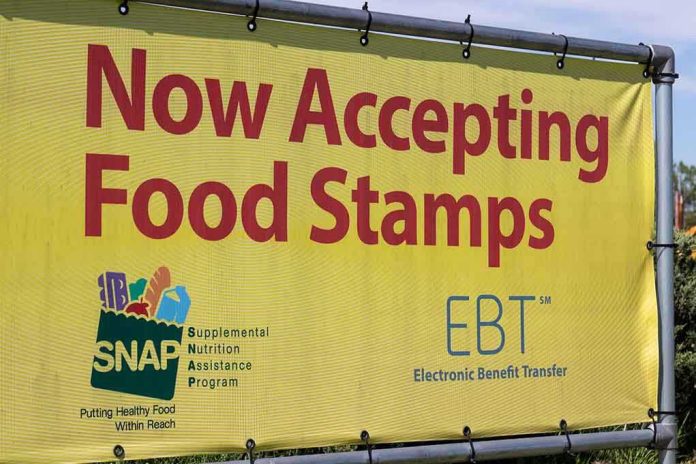
As millions of Americans brace for the loss of essential food assistance due to government gridlock, DoorDash’s emergency relief plan exposes just how vulnerable our nation becomes when Washington fails to uphold its duty to the people.
Story Snapshot
- DoorDash launches a private emergency food initiative as over 40 million risk losing SNAP benefits in a government shutdown.
- Congressional inaction threatens the largest federal nutrition program, raising concerns about reliance on private companies for basic needs.
- Food banks and gig-economy platforms face surging demand, highlighting systemic weaknesses in public welfare.
- Experts warn that corporate charity cannot replace federal safety nets, pressuring lawmakers to resolve the funding crisis.
DoorDash Steps In Amid Looming Federal Failure
On October 26, 2025, DoorDash publicly unveiled an emergency response plan designed to deliver one million free meals and waive delivery fees for 300,000 grocery orders to families at risk of losing Supplemental Nutrition Assistance Program (SNAP) benefits. This drastic step comes as Congress remains deadlocked, with a government shutdown stretching into its fourth week and SNAP funding set to expire November 1. DoorDash’s initiative, while generous, is a stark reminder of what happens when elected officials neglect their responsibilities, forcing private companies to fill critical gaps that government was meant to handle.
SNAP, previously known as food stamps, is the United States’ largest federal nutrition program, serving over 40 million Americans every month. It supports children, seniors, and working families—many of whom are already struggling with higher grocery bills and stagnant wages following years of reckless government spending and inflation. Because SNAP relies on annual congressional appropriations, it is uniquely vulnerable during shutdowns caused by political stalemates. In the current crisis, food banks nationwide are reporting unprecedented demand, as federal workers and low-income families alike face uncertainty about their next meal.
Private Sector’s Role Raises Questions About Government Priorities
DoorDash’s emergency measures, implemented in partnership with food banks and major grocers, highlight the growing influence of private platforms in addressing public needs. The company’s leadership, including Max Rettig, acknowledges that their plan is merely a stopgap—not a true solution. This intervention, while commendable, amplifies concerns about the federal government’s abdication of its constitutional responsibility to “provide for the general welfare.” As DoorDash, grocers, and gig workers step up, Americans are left to question why the world’s most powerful government cannot guarantee food security for its most vulnerable citizens, even as it funds countless unrelated priorities.
For conservative Americans, the situation embodies everything wrong with big government: bloated agencies unable to deliver on their core promises, politicians more focused on power plays than practical solutions, and an ever-expanding reliance on stopgap measures and private charity. The precedent set by this crisis—where tech giants patch over failures in public policy—should alarm anyone who values limited government, accountability, and American self-reliance.
Wider Impact: Families, Food Banks, and the Future of Social Safety Nets
The immediate effects of DoorDash’s plan will be felt by up to 300,000 households, offering short-term relief through waived fees and free meals. However, the deeper impact is a surge in demand on food banks and community organizations, many of which are already stretched thin. Over 40 million people, including 21 million children and 16 million working families, face the risk of increased food insecurity if Congress fails to act. Meanwhile, DoorDash drivers may see temporary boosts in income, but the broader implication is clear: private interventions cannot replace robust, accountable government programs.
Food policy experts and advocacy groups stress that while private charity can provide essential relief during emergencies, it lacks the scale, sustainability, and oversight of federal programs. The danger is that repeated reliance on corporate generosity could erode political will to fund public welfare, leaving millions perpetually vulnerable to the whims of both politicians and corporations. This crisis serves as a warning—America must restore constitutional governance and fiscal sanity, or risk further erosion of foundational safety nets and freedoms.
Sources:
DoorDash Emergency Food Relief: SNAP Funding Crisis Response
DoorDash Launches Emergency Food Response as SNAP Benefits Expire
‘No one should go hungry’: DoorDash is delivering relief for families losing SNAP benefits
DoorDash launches emergency response to lapse in SNAP benefits
DoorDash Newsroom: SNAP Shutdown Announcement











